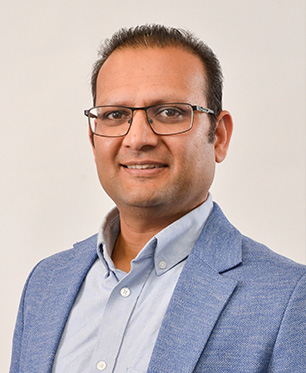
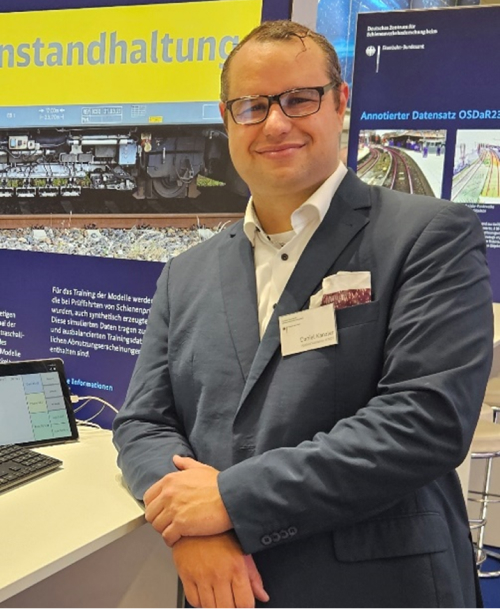
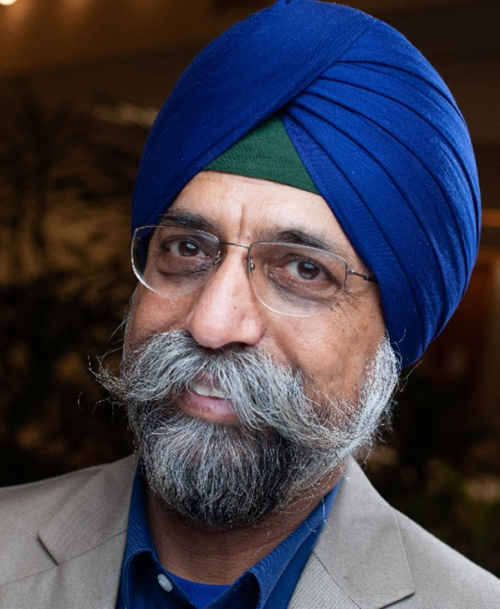
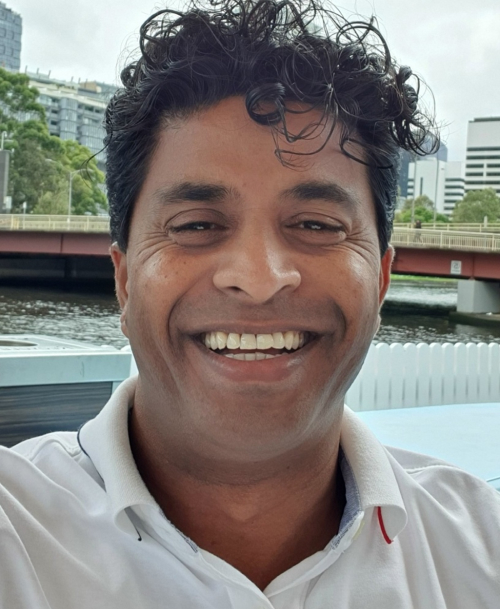
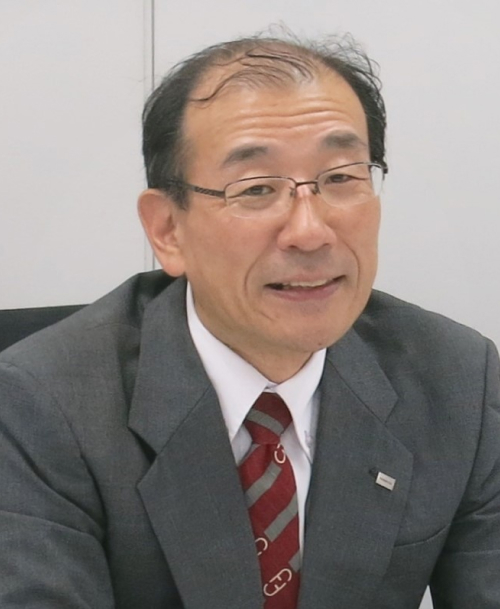
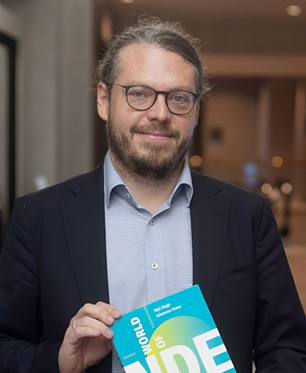
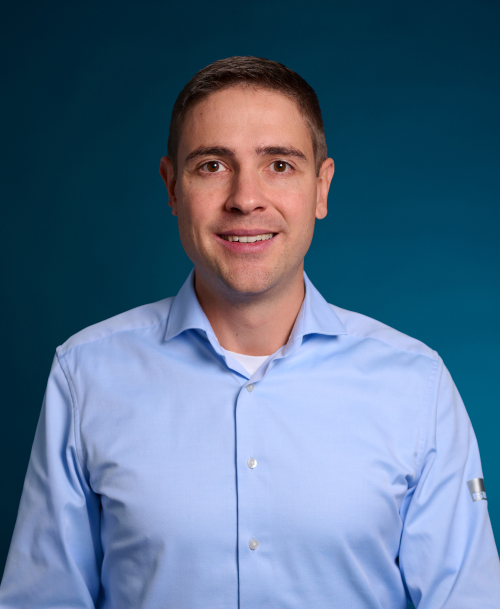
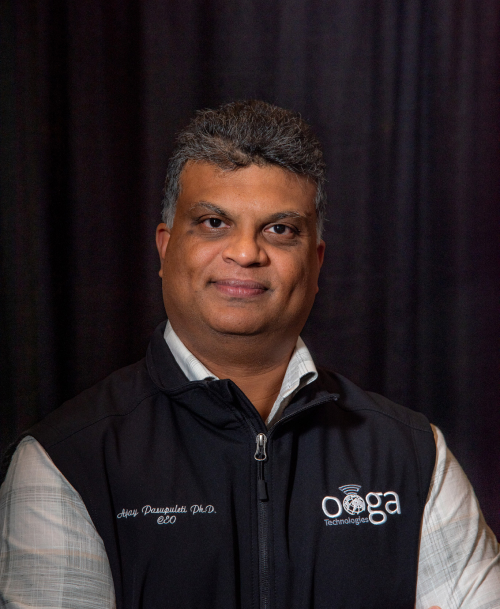
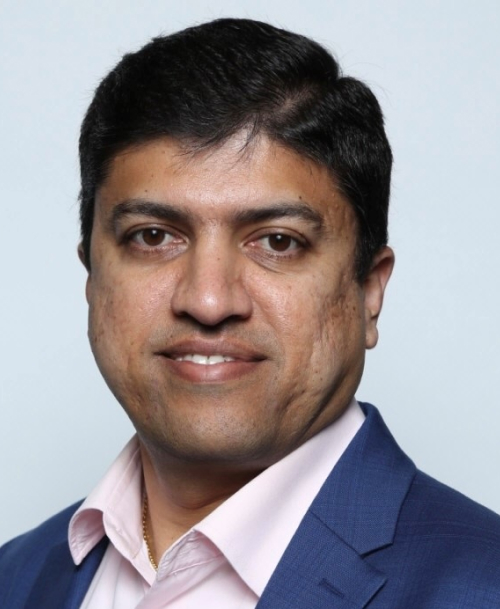
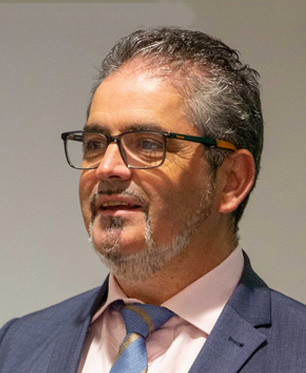
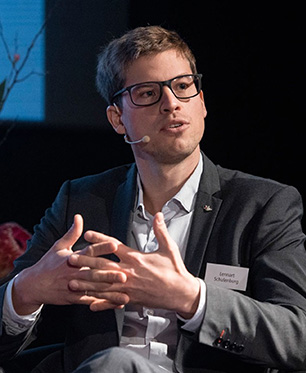
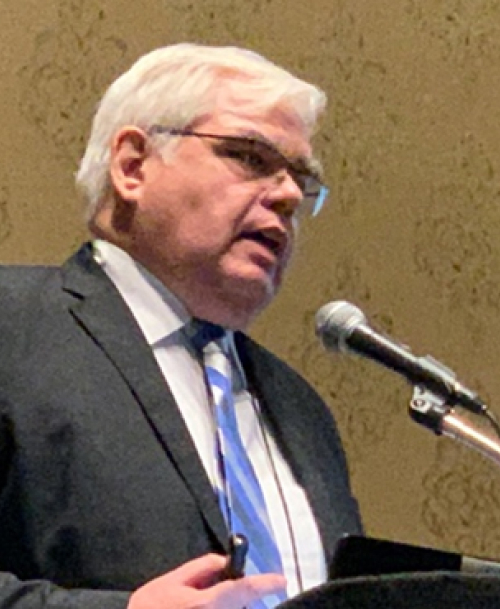
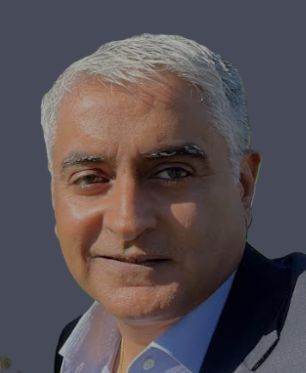
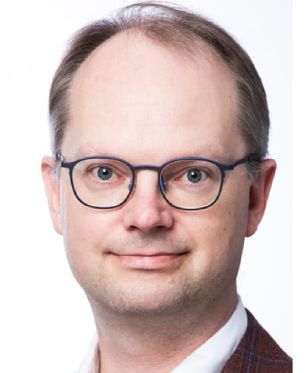
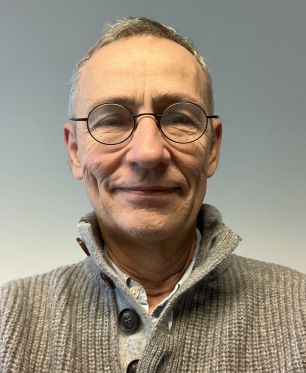
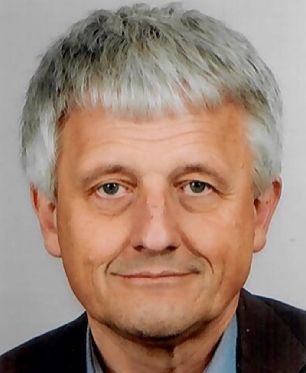
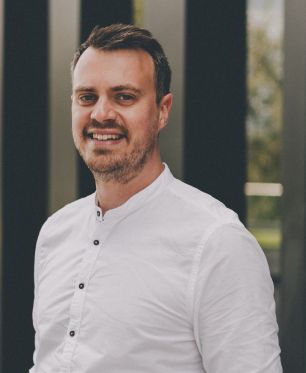
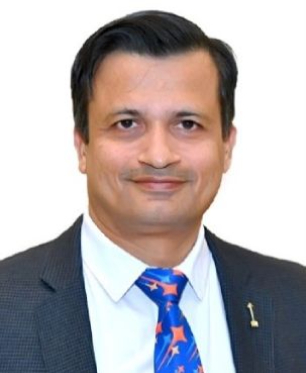
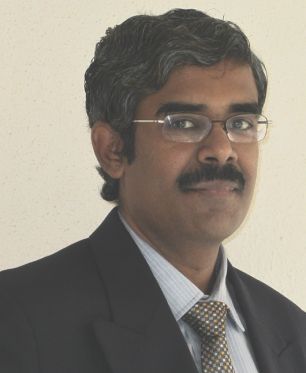
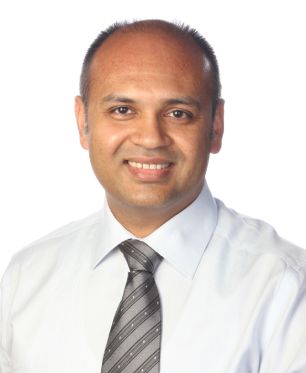
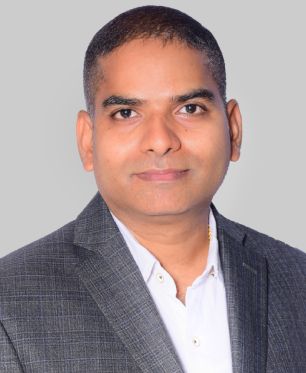
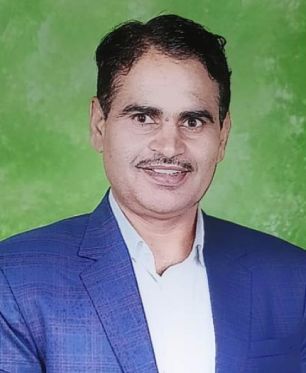
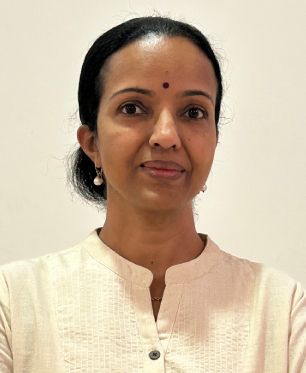
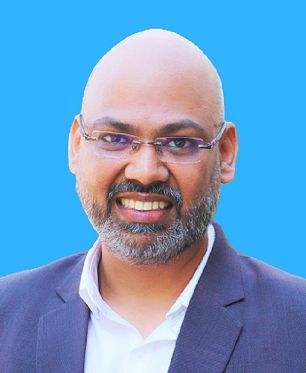
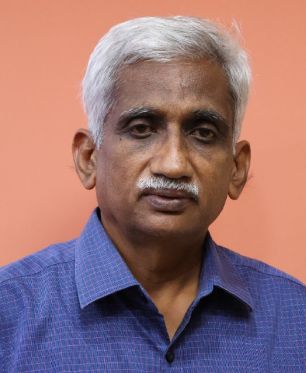
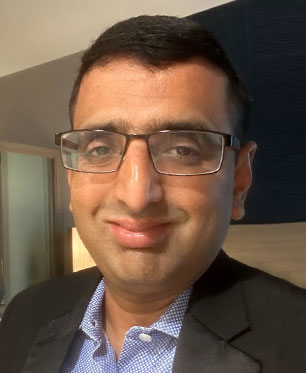
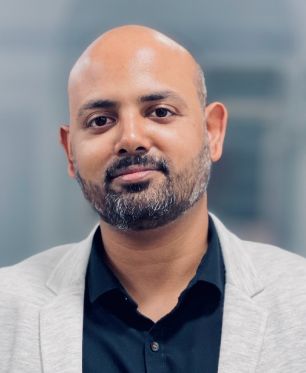

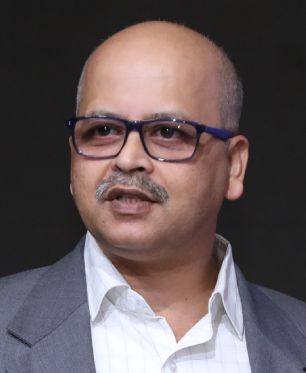
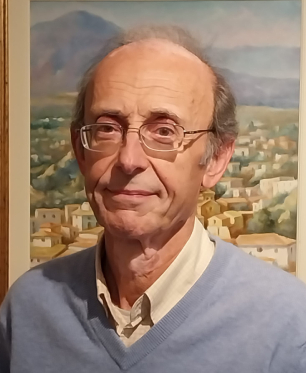
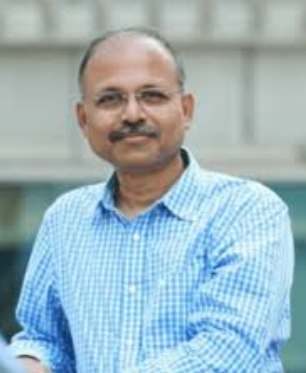
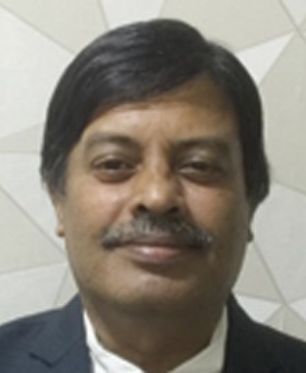

This presentation explores the real impact of Industry 4.0, specifically the Industrial Internet of Things (IIOT), in the context of predictive Corrosion Management, focusing on a compelling case of corrosion occurring under insulation. It discusses the implementation of digitalization tools and presents real-world examples of their application in the field. By harnessing digital data collection and predictive algorithms based on factors like moisture levels and temperature, hidden corrosion issues such as Corrosion Under Insulation (CUI) can be effectively managed.
Dr. Prafull Sharma currently serves as Chief Technology Officer of UK based CorrosionRADAR Ltd which is bringing innovative corrosion monitoring technologies using Industrial Internet of Things (IIoT). CorrosionRADAR invented a predictive CUI monitoring system which is gaining global traction addressing a big issue for the industry. Dr. Prafull Sharma brings vast industrial experience specially in digitalization of corrosion management on which there are several inventions to his credit. Dr Sharma did his PhD from Cranfield University UK. He is also credited with over fifteen international patents and innovations.

In the field of Nondestructive Testing (NDT), where human subjectivity significantly influences outcomes, a shortage of experts and the demanding nature of safety-critical component testing pose substantial challenges—AI has the potential to be a game-changer. But, how effective is AI collaboration, and what are its limitations? From a European legal perspective, the requirements for AI will be stringent. However, from a metric standpoint, our experience in NDT reliability will be beneficial. The evaluation process for AI will include simulations used for training data, serving as a foundation to assess its intrinsic capabilities. By comparing AI results with current NDT application outcomes, we will introduce a metric called the Reliability Evaluation Score based on relevant characteristic 'a' (RESa) to demonstrate the potential of the current AI applications. Furthermore, the connection to real-world applications will be highlighted. As showcased at the last NDE 4.0 conference, the real-world case involves testing railway components under the German railway system. This presentation will provide a clear view of the progress made in the AIFRI project.
Dr. Daniel Kanzler is a prominent expert in the field of reliability evaluation for non-destructive testing (NDT) systems, with over 15 years of experience in this area with significant and multifaceted contributions. Dr. Kanzler began his career at GE Sensing and Inspection Technologies, specializing in ultrasonic testing while completing his diploma and master's thesis on reliability. He later worked at the Federal Institute of Material Testing and Research in Berlin, where he completed his PhD in 2016. He is the Founder and CEO of a consulting company "Applied Validation of NDT," which supports international companies in NDT/E reliability. He is also Chairman of the International Committee for Non-Destructive Testing (ICNDT) Specialist Group on "NDT Reliability" since 2017, Leader of the standardization committee NA 068-08-28 under DIN, focusing on the "Qualification of testing methods" since September 2022.

NDE 4.0 represents several Digital Transformation aspects in the world for safety and quality assurance of high value assets. The two key words are ‘Digital’ referring to the means or enabling technologies and ‘Transformation’ referring to the result or the outcome. A very large percentage of companies fail to transform digitally, even though they have access to the same suite of digital technologies. The reason is the human mind. To overcome this, we need a shift from mindset to mindsight. A change in our thought process from what we are comfortable doing repetitively (set) to what is possible (sight) with a much higher value potential. As such, the transformation of the human mindset can be overwhelming as compared to insertion of digital technologies. And this non-technical aspect makes it critical to the success of any NDE4.0 program.
Dr. Ripi Singh is now a purposeful innovation coach with a lifetime of learning in technology, people, and process development. Starting with his PhD at IISc Bangalore followed by aging airplane program at Georgia Tech in 1992 as a post doc fellow. After decades of research work on fatigue & fracture, damage tolerance, human factors in NDE, he is now working hard to bring industry 4.0 perspective and innovation processes to the NDE community: with his virtual coaching lectures and articles. He has authored 20 books, 150+ peer-reviewed publications, and numerous invited and keynote lectures. Ripi and Johannes have produced the book – “The World of NDE 4.0” and also served as co-editors in chief for Handbook of NDE 4.0 along with Norbert Meyendorf and Nathan Ida. They shared the ASNT Robert McMaster Gold medal in 2022 and are also the motivating force behind the initiating the International NDE 4.0 conference series.

Digitalisation is beneficial! But planning & solution selection not only need an experienced decision-maker but also an architect without any commercial or personal conflict of interest. Otherwise, companies are gambling their precious funds and time. As the sole founder owner of the largest privately owned Australian TICS business, the author faced many challenges and learnt the hard way over the last decade. After learning further difficulties from other TICS Directors, the presentation includes insights, tips & traps in decision making, vulnerability & security issues, and genuine needs for the TICS industry “NDE N_Ext” that is beyond NDE 4.0 framework to adopt a factual eco-system.
Pranay Wadyalkar is a Chartered Engineer, CMatP, Metallurgist, AICIP, AINDT L3 in ET, UT, RT, MT, PT. Currently, as the MD at OMS Software, a digital automation company providing advanced LIMS & business management platform for Labs. Prior to OMS, he founded LMATS, the largest privately owned Australian business in the field of metallurgy, mechanical & chemical testing, NDT, Inspections. Pranay is appointed on the NATA’s NDT Advisory Committee, Steel Association Board, Australian delegate on the ICNDT, APFNDT & NDE4.0SIG. Pranay was the AINDT President from 2014-2016, and a director (2009-2017).

Non-Destructive Evaluation (NDE) is essential for the stable operation of important social infrastructure such as plant equipment, bridges, and building facilities. In this presentation, we report on a case where digital technology is used to not only enhance NDE performances but also to contribute to plant/asset value improvement by combining digitized inspection data with other related data.
We have extensive experiences in the engineering, manufacturing, and O&M of power plants and provide advanced NDT technologies such as phased array UT (PAUT) and laser ultrasonics. To begin with, we introduce two technologies as examples of NDT digitization. The first is an automatic probe position identification system using a SLAM technology. This technology does not require an encoder or automatic machine and can digitally record the probe position during inspection even on flexible 3D shapes. The second is a PAUT result evaluation supported by AI. This was originally developed for the core shroud of nuclear power plants and is a highly accurate AI with an error of crack depth measurement less than 1.2 mm from the manual inspection results carefully evaluated by experts.
Then, we also have the technology to analyze the progression of deterioration and predict the lifetime of structures based on their design, material, and manufacturing data. NDT data is the most important input of this process; that is, NDT data obtained in the physical domain is digitized and it is analyzed and evaluated in the cyber domain, and the analysis results achieved in the cyber domain are linked with data other than NDT and fed back to the physical domain as solutions, such as optimization of O&M, reformulating inspection/repair plans and changing operating conditions. This is expected to bring great benefits to asset owners.
In this presentation, we will discuss the inspection data and its digitization of important equipment in nuclear plants, and how it can be used for high-precision crack progression analysis that reflects residual stress and material properties to predict the actual realistic lifetime of structures.
Makoto Ochiai started his research career in 1991 at Toshiba Corporation in Yokohama, Japan. For the first 15 years, he was mainly involved in the development of advanced UT techniques such as practical laser ultrasonic testing and phased array UT. His achievements are implemented today in many turbine factories and nuclear power plants around the world. He then served as a leader engineer of the Plant O&M Technology Development, an R&D Leader for Operating Nuclear Plants, and has been the Technology Executive for Toshiba's Energy Division since 2022. Also, he is currently a member of the ICNDT SIG on NDE 4.0 and serves as a vice president of JSNDI.
NDE4.0, data collaboration, advanced UT, SLAM, AI, CPS

Non-Destructive Evaluation (NDE) plays a critical role in ensuring the integrity and safety of assets within the natural gas industry. However, many utility companies face a significant challenge: they lack qualified Non-Destructive Testing (NDT) personnel and rely on external contractors for inspection and analysis. This dependency, coupled with the increase in NDT failures reported by the Pipeline and Hazardous Materials Safety Administration (PHMSA) in recent years (DOT/PHMSA, 2023), underscores the urgent need for innovative solutions to enhance the reliability of NDT data.
NDE 4.0 brings significant advancements to the industry through digital twins, artificial intelligence, and automated defect recognition systems. By automating large portions of the inspection process, these technologies allow for faster data collection, increased accuracy in defect detection, and comprehensive asset monitoring. This capability helps companies to preemptively identify risks and manage potential failure points before they become critical, fundamentally enhancing both safety and cost-efficiency. Additionally, NDE 4.0 facilitates more efficient data integration and visualization, enabling stakeholders to make informed decisions with real-time insights.
The benefits extend to predictive maintenance and lifecycle management. With enhanced data reliability and advanced analytics, utility companies can transition from a reactive “repair after failure” model to a proactive maintenance approach. This shift results in fewer disruptions, reduced maintenance costs, and extended asset lifespan, which is especially crucial in an industry where asset integrity directly impacts public and environmental safety.
Con Edison (Con Ed) and other utility companies are exploring ways to use the Ooga platform and NDE 4.0 tools to support this shift, leveraging automation to increase quality and establishing a robust framework for continuous, predictive monitoring. By converting data lakes into actionable insights, these innovations pave the way for safer, more efficient operations and strengthen the resilience of gas infrastructure across the industry.
Ajay Pasupuleti is an entrepreneur with over 18 years’ experience in image processing, data management and archival technologies. As founder and CEO of Ooga Technologies he strives to bring the worldwide NDT community closer through the Ooga Platform by improving efficiencies, and ensuring knowledge is not lost through attrition and/or retirements. Under Ajay’s leadership, Ooga Technologies was awarded the 2024 Grepbeat startups to watch honoree. Ajay received his Ph.D., in Electrical and Microsystems Engineering from Rochester Institute of Technology, Rochester NY in 2006.

Non-Destructive Evaluation (NDE) plays a critical role in ensuring the integrity and safety of assets within the natural gas industry. However, many utility companies face a significant challenge: they lack qualified Non-Destructive Testing (NDT) personnel and rely on external contractors for inspection and analysis. This dependency, coupled with the increase in NDT failures reported by the Pipeline and Hazardous Materials Safety Administration (PHMSA) in recent years (DOT/PHMSA, 2023), underscores the urgent need for innovative solutions to enhance the reliability of NDT data.
NDE 4.0 brings significant advancements to the industry through digital twins, artificial intelligence, and automated defect recognition systems. By automating large portions of the inspection process, these technologies allow for faster data collection, increased accuracy in defect detection, and comprehensive asset monitoring. This capability helps companies to preemptively identify risks and manage potential failure points before they become critical, fundamentally enhancing both safety and cost-efficiency. Additionally, NDE 4.0 facilitates more efficient data integration and visualization, enabling stakeholders to make informed decisions with real-time insights.
The benefits extend to predictive maintenance and lifecycle management. With enhanced data reliability and advanced analytics, utility companies can transition from a reactive “repair after failure” model to a proactive maintenance approach. This shift results in fewer disruptions, reduced maintenance costs, and extended asset lifespan, which is especially crucial in an industry where asset integrity directly impacts public and environmental safety.
Con Edison (Con Ed) and other utility companies are exploring ways to use the Ooga platform and NDE 4.0 tools to support this shift, leveraging automation to increase quality and establishing a robust framework for continuous, predictive monitoring. By converting data lakes into actionable insights, these innovations pave the way for safer, more efficient operations and strengthen the resilience of gas infrastructure across the industry.
Prashanth Kadaba is a seasoned professional with extensive experience in the natural gas sector. Currently serving as the Department Manager for Gas Engineering Welding Center of Excellence at Con Edison in New York. Con Edison operates one of the world's largest energy delivery systems providing energy for 10 million people who live in New York City and Westchester County. In his current role, Prashanth leads a team of welding engineers, Nondestructive Testing (NDT) professionals, and data analysts, focusing on establishing a centralized group for welding and NDT related guidance and support. Prashanth is also actively involved in the industry committees such as the ANSI Z380 (Gas Piping Technology Committee), AGA/API Joint Committee for welding of pipelines (API 1104 Committee), and ASTM E.07 (Nondestructive Testing) Committee. He is a currently a participant in the ASNT's prestigious RISE Leadership Program and actively involved in their Industry Energy Council to streamline the industry gaps related to NDT. He is a native of Bengaluru but lives with his wife and two children in New York.

The term NDE 4.0 was introduced in 2017 to represent the cyber-physical confluence of the various physical nondestructive evaluation methods with the digital technologies associated with Industry 4.0. Its value is either generated by improving nondestructive evaluation with those technologies (digitalization) or by implementing nondestructive evaluation as one of the most valuable data sources for Industry 4.0 applications (digital transformation). Quickly, NDE 4.0 became all around the globe a rapidly growing new field with multiple special issues in scientific journals, an extensive handbook, its own conference series, and a topic with one of the highest numbers of papers submitted at every NDT conference. In this paper, the authors build a unified model of the industrialized society covering value creation and consumption and work through the digital penetration of the ecosystem in the context of NDE, providing clear definitions and understanding of many of the frequently used terms. This clarifies the main role of NDT&E, Structural Health, Condition, and Production Monitoring as well as Metrology in times of digital transformation: Machine Perception. The paper also shares a few success stories as discrete pieces of the mega puzzle, we are all engaged in building. Small successful steps help overcome people's concerns and attitudes and motivate us to create roadmaps for personal and company growth, leading to a bright future.
Dr. Johannes Vrana is a seasoned consultant, physicist, and data scientist with over two decades of experience in NDE. A recognized leader in NDE 4.0, he actively contributes to national and international societies and serves as editor of the Journal of NDE and editor-in-chief of the Handbook of NDE 4.0. His numerous publications and awards highlight his significant impact on the field.
Through his company, Vrana GmbH, he empowers organizations to harness the potential of digital technologies and transformation. His services include consulting and workshops, R&D, training, software development, and cyber-physical solutions.

Whereas a few years ago, ultrasonic testing electronics were still the heart of an automated testing system, today's system concepts are developing more and more in the direction of intelligent & multimodal production systems, where the actual ultrasonic hardware is a small part of the overall system and smart integration in the context of digitalization is the key to efficiency in composite production. The combination of different inspection methods in the sense of “multi-modality” is another key to increasing productivity on the one hand, but also to reducing the space required for automated inspection systems. In the first part of the presentation, the integration of dry testing methods in industrial systems will be presented in addition to conventional water-coupled ultrasound. Laser-coupled air ultrasound and thermography are perfectly suited as complementary technologies in the field of innovative composite production. Although cross-technology and non-proprietary data formats are still in their infancy, they are the key to the future application of intelligent evaluation algorithms in an industry in which manual evaluation of test results is still “state of the art”. What has long been used in the industrial environment in the field of imaging inspection methods (X-ray) is still in a very early stage in the ultrasound sector.
The presentation introduces innovative digitalization approaches that serve both traceability and increased efficiency. A reference project at a European helicopter manufacturer shows that it is not worth looking at a test system in isolation, but rather including the entire production workflow. In this example, the entire specimen set-up process was digitalized and partially automated, drastically reducing the risk of unplanned system downtime. The trick in this project was to find the right balance between mechanization and automation.
Thomas Gramberger has more than one decade experience in developing automated NDT & Metrology Systems for the Aerospace Industry. His former activities in Automotive (Solutions for OEMs with Focus on Robotics and Simulation) is a good base to get use of Synergies from both industries. Introducing precise NC controlled robots in the NDT world is his passion, as he is convinced about the added value, this technology is giving to various inspection technologies. Multi-Modality is the new approach, bringing Aerospace Manufacturing Companies one step ahead - as automated systems can combine several NDT Inspection Methods, but also contactless Metrology (CMM).

For over two decades, the digital DNA of the two organizations described in the Use Cases of this presentation has served not only as the cohesion element that brings together an integrated and dynamic ingenuity ecosystem but also as the catalyzer of consistent innovations in telepresence technologies and digital platforms that uses the state of the art of knowledge and technologies.
Milestone projects are those developments that, at the time of their creation, comprise a series of unprecedented characteristics or challenges in an industrial sector or geographic region. Milestone projects are always a source of important opportunities for research, innovation, learning, and technological development
The purpose of this presentation is to share both successful best practices and our exploration of the state-of-the-art technologies that enable organizations to confidently Enrich, Expand, and Reinforce Remote Technical and Strategic Support Processes on the Milestone Projects that are associated with digitally transformed NDE processes and systems.
Ramón Salvador Fernández Orozco is a civil engineer with a major in structural design. He has a dual degree MBA with a specialization in strategic business management from Regis University and technology and innovation management and research processes by ITESO. He is a certified ASNT NDT Level III in RT, UT, MT, PT, VT, and LT.
Since 1986, he has coordinated projects and programs focused on quality improvement, automation, AI systems deployment and innovation for projects located in four continents and 19 countries. Ramon's company, Fercon Group, provides highly specialized engineering consulting services and strategic mentoring guidance for organizations ranging from single-person practices to 180,000-employee multinationals.
He participates as a Member of the Research and Education Councils and of the AI/ML, Publications, Mentoring and NDE 4.0 Committees for the American Society of Non-Destructive Testing (ASNT), member of the Committee E07 on Nondestructive Testing for the American Society for Testing and Materials (ASTM), a member of the AI Assisted Analysis Workgroup in the American Society of Mechanical Engineers (ASME) BPVC Section V Committee and Platform Development Commission Coordinator for the Special Interest Group on NDE 4.0 for the International Committee for Non-Destructive Testing (ICNDT).
He has published articles and research results on the development of his professional work that have been accessed in over 82 countries on four continents and has lectured about them at forums in Mexico, the United States, Chile, Brazil, France, Germany, and Switzerland.

Since the presentation of the concept of “Nonlinear signal processing for NDT 4.0” in front of the European community of Nondestructive Testing (ECNDT 2018), new data processing tools used for localization and classification of nonlinear ultrasonic (UT) scatterers have gain importance within the nonlinear UT community. One of the “feuille de route” of the new created ICNDT working group Nonlinear-UT emphasizes the need of a growing research for using Artificial Intelligence (AI) for describing statistically, in the spirit of the physics of fundamental particles, the nonlinear ultrasonic signatures so difficult to activate, detect and localize in complex medium under test, or during automated digitalized industrial set-ups. In this context, “Industry 4.0” stands for the fourth industrial revolution, the transition from production by computer controlled isolated testing machines to the concept of a smart factory, where machines, materials under test, and personnel are digitally connected, to actively adapt to changes in workflow. To assure quality, embracing digital transformation of non-destructive evaluation (NDE) is essential. NDE must be considered in conjunction with other engineering disciplines. Reliability assessments become a prerequisite for the use of NDE data, including Nonlinear-UT. Model-based definition, smart robots, AI, augmented reality, and digital twins can all be used to enhance NDE inspections to a new level of performance in quality and safety assurance. The digital transformation of these new NDE trends are summarized under the term “NDE 4.0” to meet the needs of Industry 4.0 transitions within the NDT community.
An NDE 4.0 example within Nonlinear-UT will be presented some practical Time Reversal based Nonlinear Elastic Wave Spectroscopy (TR-NEWS) experiments on Wire Arc Additive Manufacturing (WAAM) samples where new signal processing tools using quaternions signal representation have been implemented experimentally within the DICONDE standards.
Serge Dos Santos received the Master Degree of Physics with the mention Molecular Spectroscopy and Nonlinear Physics from the University of Dijon, France.
His research interests are in the broad area of signal processing for Non Destructive Testing (NDT) and biomedical applications, with a special focus for experimental data generated from nonlinear ultrasonics instrumentation, nonlinear sources localization, and multimodal imaging involving nonlinear time reversal methods.
Currently, Serge Dos Santos is Associate Professor, Hab. Dir. Rech., at the Department of Industrial Systems of the INSA Centre Val de Loire (INSA-CVL), Blois, France. His bibliography contains 251 references with 126 co-authors, including 1 book, 3 book chapters, 22 reviewed contributions, 176 international conferences (30 invited) and 50 seminars or lectures. For his outstanding contribution to the growth and dissemination of Non Destructive Testing knowledge to the worldwide community, he was awarded by Academia NDT International as a Full Member (ECNDT 2010, Moscow), responsible of the Signal and Data Processing Chapter, Member of the Council since 2014 and Vice-President since 2021. As IEEE Senior Member since 2016, he is also active in the IEEE France Section as member of the EMB Chapter and Action for Industry (AfI) within the IEEE R8 Region. Since May 2020, he contributes to the NDE4.0 Global Ambassadors Panel, member of the ICNDT NDE4.0 SIG and Nonlinear-UT SIG. He is also an active member of the COFREND Data and AI working groups since 2023. In 2024, he created as a petitioner and became the first chair of the IEEE UFFC France Chapter.

The integration of Artificial Intelligence (AI) into industrial processes is revolutionizing the field of non-destructive testing (NDT), particularly in X-ray testing applications. This presentation provides a comprehensive exploration of how AI technologies—specifically machine learning and deep learning algorithms—are transforming X-ray testing methods. By enhancing defect detection capabilities, improving efficiency, and offering strategic advantages, AI is becoming an indispensable tool in ensuring material integrity and quality assurance.
The presentation begins with an introduction to AI in X-ray NDT, explaining the basics of AI technologies and their relevance to X-ray testing. It examines how AI alters traditional X-ray inspection methods, shifting from manual interpretations to automated, intelligent analyses. The enhanced detection and analysis capabilities of AI are demonstrated, showing how algorithms can detect minute defects and anomalies within materials that might be missed by human inspectors.
Real-world examples from industries such as aerospace, automotive, and energy are presented, where AI-enhanced X-ray testing has been successfully implemented. These practical applications and case studies illustrate the significant impact of AI on improving inspection processes and outcomes. The discussion also addresses challenges like data quality issues, the need for large datasets for training, and integrating AI into existing workflows, along with proposed solutions to overcome these obstacles.
Looking ahead, the presentation explores future developments, including predictive maintenance, real-time monitoring, and the role of AI in advancing Industry 4.0 initiatives. The objective is to inform and encourage industry professionals to consider the adoption of AI technologies to enhance their NDT processes, ultimately leading to improved product quality and operational efficiency.
To achieve these objectives, the presentation covers strategies for data acquisition and management, essential for collecting and handling large volumes of high-quality X-ray imaging data necessary for training AI models. It provides an overview of machine learning and deep learning techniques used to create models capable of analyzing X-ray images with high precision. The processes for training AI models using labeled datasets and validating their performance against standard benchmarks to ensure reliability are explained in detail. Steps for incorporating AI models into existing X-ray testing equipment and workflows are outlined, including hardware and software considerations. The importance of interdisciplinary collaboration between AI specialists, NDT experts, and industry professionals is highlighted as a key factor in successfully implementing AI solutions. The incorporation of AI into X-ray testing marks a significant advancement in NDT, offering numerous benefits. AI models can identify defects with higher accuracy than traditional methods, reducing the risk of undetected flaws. Automation of the analysis process speeds up inspections, allowing for real-time or near-real-time results. Enhanced detection capabilities and efficiency lead to fewer false positives and negatives, reducing rework and associated costs. Companies adopting AI technologies position themselves as industry leaders, capable of meeting higher quality standards and customer expectations. Furthermore, AI lays the groundwork for further innovations, such as predictive maintenance and fully automated inspection systems, contributing to the evolution of smart factories.
The transition to AI-enhanced X-ray testing is not just a technological upgrade but a strategic move that can redefine quality assurance protocols. Industries stand to gain significantly by adopting advanced technologies, staying ahead in a competitive market by leveraging cutting-edge AI solutions. By enhancing product reliability through more accurate defect detection and optimizing resources by allocating human expertise to more complex tasks while AI handles routine inspections, companies facilitate innovation and enable new possibilities in design and manufacturing through better material analysis.
In conclusion, embracing AI in X-ray testing is essential for industries aiming to improve their NDT processes and remain competitive in the global marketplace. This presentation provides valuable insights and practical guidance on how to navigate this technological transformation successfully.
Lennart Schulenburg is an author and expert in Non Destructive Testing (NDT) and quality control. As CEO of the X-Ray innovator VisiConsult X-ray Systems & Solutions from Northern Germany, he has a extensive experience in industries ranging from automotive to aerospace. VisiConsult was founded in 1996 and is a leading supplier of digital X-ray and Computed Tomography solutions to customers worldwide. With a degree in Computational Informatics and a MBA, he successfully initiates insightful technology development and is a regular speaker at industry events to share the latest trends and innovations in quality control and impact on the broader organization.

Textual descriptions of assets and associated defects require an inspector to read and comprehend the written content and then create a visual picture of the result as a part of understanding and analysis. Using standard (2D) images and photos assists this process significantly, reducing comprehension time and visualization errors. Part of the allure of 3D imaging and the creation/usage of digital twins in NDE is the ability to improve further the speed and accuracy of this understanding and analysis of assets and defects, providing an almost immediate holistic perception for all viewers.
The authors suggest that integrating 3D visualization of assets that are to be inspected into NDE workflow software (along with indication/defect information tagged in 3D on the digital asset) will provide more clarity for inspectors so that they can more rapidly and accurately analyze and assess the asset's current condition. Furthermore, tracking progressive 3D digital representations captured over time will lead to earlier detection of anticipated issues, better decisions about the asset's maintenance and care, and a longer and healthier lifespan for the asset. Other benefits include better communication among various stakeholders, reduced rework, more rapid troubleshooting of inspection problems, a reduction in the time and expense of asset inspections, and the ability to build better and maintain accurate digital twin models.
In this presentation, the authors will expand on the concepts for integrating immersive 3D visualizations with NDE inspection workflow software and outline the long-term expected benefits to their end customers.
Mr. Nandu Vellal has a background in Mechanical Engineering and over three decades of experience in product design and development, 3D Design, CAD/CAM, 3D Visualization, and 3D Printing. Extensive experience in full life-cycle design, development, and deployment of Enterprise IT Systems, including ERP, Business Intelligence, and Data Integration applications. Mr. Vellal is currently working on AR/VR/XR, Digital Twins, and Predictive Analytics Solutions for Industry 4.0 applications.
Mr. Vellal is currently developing custom applications for NDE/NDT in 3D visualization, Gen. AI, custom NDE workflow, and inspection collaboration tools. Mr. Vellal has also been evangelizing OpenUSD (Open Universal Scene Description) for NDE/NDT over the past couple of years by developing solutions for 3D visualizations, Digital Mockups, and Digital Twins using OpenUSD. OpenUSD is an emerging standard (to represent objects in 3D) for Digital Twins and Industrial Metaverse.

Inspection of attenuative materials with complex, variable grain structure, such as large forgings, is a significant challenge in NDE. High and varying attenuation within these materials makes detection and sizeing of flaws difficult, moreover relying on amplitude thresholds alone to automate the inspection is impossible. As a result, defect detection in such materials requires an approach that is less affected by these material conditions. This study investigates an AI-powered approach to ultrasonic inspection using Plane Wave Imaging Total Focusing Method (PWI-TFM), with the purpose of conducting fully automated inspection to highly attenuative and varying grain structure. This automation is achieved using a machine learning mdoel.
The PWI-TFM technique offers a critical advantage in this context due to its superior signal-to-noise ratio (SNR) compared to conventional phased array and standard TFM methods. In materials with high attenuation, the PWI-TFM method can insonify the test piece, effectively distinguishing flaws even within larger grain size areas with high attenuation. The machine learning model analyses the PWI-TFM data in real time, allowing completed report as the scanning finishes. This increases throughput and efficiency significantly.
The results demonstrate that the AI-powered PWI-TFM technique significantly improves detection sensitivity, even in highly attenuative materials, providing a robust alternative to traditional ultrasonic inspection methods. Our findings indicate that this AI-driven approach not only adapts to varying material properties but also provides consistent and reliable assessment capabilities in challenging inspection scenarios. The integration of AI in PWI-TFM highlights its potential as an adaptable, high-precision NDE solution, advancing the quality and reliability of inspections in industries that rely on robust material integrity analysis.
Iikka Virkkunen is the Managing Director of Trueflaw Ltd. and an Adjunct Professor at Aalto University, specializing in materials degradation and non-destructive testing (NDT). At Trueflaw Ltd., founded in 2001, Virkkunen leads the development of innovative NDT solutions, including the production of realistic flaws for inspection qualification and the integration of machine learning into NDT data analysis. His work has been pivotal in advancing the application of AI in NDT, enhancing the efficiency and accuracy of defect detection in industries such as aerospace and nuclear power. Virkkunen has authored numerous publications, including contributions to the "Handbook of Nondestructive Evaluation 4.0," where he discusses the new paradigm for NDE inspection personnel. His recent work includes the development of ENIQ Recommended Practice 13, providing guidance on the qualification of NDT systems utilizing machine learning. Virkkunen's expertise and leadership continue to drive innovation in NDT, bridging the gap between traditional engineering practices and modern AI technologies to address complex challenges in material science and engineering.

Structural Health Monitoring (SHM) plays a crucial role in ensuring the safety and longevity of structures. Guided elastic waves are an attractive solution to monitor elongated components such as plates, pipes or rails, thanks to their capability to propagate on large distances and their high sensibility to defects. A network of piezoelectric transducers is then deployed on the structure to emit and receive these waves, in order to feed advanced decision-making algorithms.
The complexity of GW signals and variability of operational conditions lead to difficulty in terms of robustness for the detection and characterization capabilities in real environment. We present here the development of AI-enhanced data processing implementation for guided waves signals. The AI model is applied on GW images computed in real time using Delay-and-Sum (DAS) algorithm. The training of the model uses simulated and experimental signals applying a transfer learning approach. The full processing chain is embedded on the 8-channel acquisition system “Geronimo” developed by CEA List and University Gustave Eiffel. It uses the framework AIDGE, an open source Deep Learning Platform for Embedded, developed also by CEA List. We finally describe the current work in progress on Geronimo system, with enhanced data processing features as a temperature compensation based on AI.
Pierre Calmon received in 1990 his PhD in Physics at the University of Paris XI, France. Since then, he has been pursuing his career as researcher at CEA in the field of Non Destructive Evaluation. He has been involved in the development of the CIVA simulation platform since its beginnings with a focus on ultrasonic modelling and array imaging. Scientific director of the NDE department of CEA List and CEA fellow, his current fields of interest are NDE reliability, simulation and digital technologies applied to NDE and Structural Health Monitoring. He is President of the Scientific Pole of the French Non Destructive Testing society (COFREND) and is chairing the NDT commission (C-V) at the International Institute of Welding. He is an active member of various international working groups at ICNDT, ENIQ, SAE.

Engineering structures today can be assessed with a variety of powerful instruments. This includes numerical tools on the one side and monitoring tools on the other. With this the life cycle of those structures can be well assessed and this much better than in the past. On the other hand, a lot of data is generated and this needs to be handled in an appropriate way. Looking at the structure's performance it includes data describing the structure in terms of loads applied, its geometry, dynamic performance, stresses and strains, fatigue degradation and non-destructive inspection (NDI), all leading to structural health monitoring (SHM) in the end. It is specifically the latter two aspects leading to NDE 4.0 and demonstrating the role NDE 4.0 has with respect to structural assessment in general.
To get this demonstrated, a symmetric rig of two I-beams made of structural steel S235 has been loaded under 3-point bending. The beams have been described numerically with respect to their geometry, loading, dynamic behavior as well as the fatigue degradation. Furthermore, the beams' geometry has been scanned and data have been recorded with respect to their static and dynamic loading. The techniques used included a sophisticated laser scanner, different sensors for measuring strain and vibrations, and methods known in non-destructive testing (NDT) such as classical eddy current (EC) and the Metal Magnetic Memory (MMM) method measuring magnetic stray flow. To further get a feeling of how far EC is able to measure fatigue degradation, EC measurements were made along fatigue tests done on conventional unnotched fatigue specimens. All of the data recorded has been merged and it will be shown how these can be visualized in a way such that a structure's life cycle tracking can be performed on a mainly continuous basis.
Christian Boller studied civil engineering at the Technical University of Darmstadt/Germany and received an engineering doctoral degree in the field of material mechanics and fatigue life evaluation from the same institution in 1987. Having been active in the field of materials technology at Battelle-Europe in Frankfurt/Germany for a few years, he moved into the aircraft development division of MBB Military Aircraft (today Airbus) in 1990, where he became the chief engineer aerostructures in 1998. In 2003 he was appointed the chair of 'Smart Structural Design' at the University of Sheffield/UK. From 2008 until 2020 he was director of Fraunhofer IZFP. Since 2008 he holds the chair for Non-Destructive Testing and Quality Assurance (LZfPQ) at Saarland University, which he still runs after his retirement in 2020. He was the director of the NDT master course programme at Dresden International University (DIU) from 2013 to 2024. From 2014 to 2019 he served as a visiting professor at the School of Aeronautics of Nanjing University of Aeronautics and Astronautics (NUAA) in Nanjing/China. He is the author and co-author of more than 300 publications including 'Materials Data for Cyclic Loading' (1987) and 'Encyclopaedia on Structural Health Monitoring' (2008) both a 5-volume compendium each. He is also one of the central organizers of the 'European Workshop on Structural Health Monitoring' and the 'Symposium on NDT in Aerospace'. In 2009 he was awarded the Structural Health Monitoring Lifetime Achievement Award and in 2023 he was nominated as a Honorary Fellow of the Indian Society for Non-destructive Testing (ISNT).

The advent of Artificial Intelligence (AI) in Non-Destructive Testing (NDT) has opened new avenues for enhancing inspection reliability, efficiency, and accuracy. While the technological capabilities of AI systems in image analysis, defect detection, and pattern recognition have been well-documented, the dynamics of human-AI collaboration remain underexplored. To address this gap, the authors conducted a series of studies focusing on how inspectors and AI systems interact in NDT scenarios. These studies aimed to evaluate the interplay between human expertise and AI-driven analysis, emphasizing trust, decision-making processes, and overall performance improvements in inspection tasks.
This presentation will provide an in-depth overview of our findings, offering valuable insights into the practical implementation of AI in real-world NDT applications.
We explored two key collaborative models:
Additionally, the studies revealed nuanced insights into scenarios where AI either enhanced or hindered human performance. For instance, inspectors relying solely on AI recommendations occasionally missed context-specific anomalies, underscoring the necessity of balanced interaction protocols.
Our presentation will conclude with actionable recommendations for implementing effective human-AI collaboration frameworks in NDT, supported by real-world examples and performance metrics. By aligning technological innovation with human expertise, we aim to foster a future where AI systems serve as indispensable partners to inspectors, driving the NDE 4.0 vision forward.
This work not only demonstrates the transformative potential of AI in NDT but also advocates for a human-centric approach to its deployment, ensuring that technology empowers, rather than replaces, the inspector's critical role.
Christian Els is one of the co-founders and managing director of sentin GmbH. His company offers AI and digital automation solutions for Non-Destructive Testing in a wide range of industries. Prior to sentin, Christian worked at Bosch, implementing digital services and products into the company's traditional business lines. He is chairman of the AI work group of the German Society for Non-Destructive Testing, Chairman of the DIN technical committee of AI in NDT, part of the standardization work group on AI/ML of ASNT and a regular speaker at various international conferences on AI in NDT, digital transformation and entrepreneurship. Likewise, Christian is one of the state representatives of the German Startup Association and has additionally been active in mentoring and coaching for tech startups and ventures for over 4 years.

Manufacturing has become the backbone for economy and with growing demand in both domestic and exports, it has become imperative for the enterprises to look for ways to produce more with consistent quality and that too at a lesser cost. Challenges faced in plants have also grown multi-fold due to rising raw material cost, skilled workers availability, quality issues, pressures of improving process and machine efficiency
Traditional ways of manufacturing with just use of machines and high level of robotic automation will not help to manage the complex and multilevel challenges being faced in current situation. Manufacturers have reached to a level where they have maximized the benefits from machines, to get to next level of efficiency and productivity use of digital technologies will be must.
While few enterprises have made remarkable impact through digital, but many are still struggling with ROI calculations, where to start and how to go about transformation journey. There are also multiple apprehensions like investments are high and will make value only for large global enterprises. Manufacturers also feel, building digital skills at organization level is difficult and workers will not support the change.
All these concerns are real but thankfully not very difficult to manage. What we need is structured approach to move towards digitalization. Starting point is to understand the current challenges, gaps in processes & technology and the digital maturity assessment framework can be of big help. Design Thinking is another methodology being extensively used to identify solutions that workers will accept. Simple low cost and easy to deploy solutions are available that can help address operational visibility, inventory management, maintenance, quality and worker related issues in plants
Join the session to learn more about how to leverage these structured tools and digital solutions to build future ready factories
Amit is Founder and Managing Partner of digiXLT Consulting. Prior to starting digiXLT, Amit has held leadership positions at NASSCOM, IBM, General Electric, and RPG Transmission in a career spanning over 30 years. He also works as an Advisor to Newscom COE.
Having worked with industrial and technology companies in multiple domains, Amit has gained a rich and diverse experience in using digital technologies such as AI, Cloud, Analytics, and IoT to usher in greater efficiencies in manufacturing and driving business growth. At GE, Amit led the global NDT product development team working on portable and testing machines across modalities. He engaged with manufacturers guiding them on technology solutions that can help in improving NDT process at plants.
Amit has spoken at more than 150 conferences and roundtables on digital transformation and is a firm believer in making optimum use of technology for transforming internal business processes. At nasscom, Amit led the program funded by Ministry of Electronics & IT and Gujarat Government to accelerate digitization in the manufacturing sector.
Amit is a certified Lean Six Sigma Black Belt and expert in devising Design Thinking methodology for building technology roadmaps and solving complex business challenges.
He is also a certified Smart Industry Readiness Index Assessor and trained to evaluate manufacturing enterprises on digital maturity and advice for transformation journey.
Amit advices enterprises and startups on business strategy, process improvement and building technology roadmap.

Industry 4.0 or the fourth industrial revolution is a wide canvas for implementation with a basket of technologies. It is not an initiative only for the industrial sector or manufacturing in factories. Other industries such as healthcare and retail are adopting it too according to the requirements. Industry 5.0 is not a destination to reach, but a journey for organizations to embark upon with realistic milestones to achieve. A maturity model is an effective approach for organizations to understand where they stand in the journey, define a road-map with time-bound milestones to reach, and reap the benefits of each accomplishments, given their risk appetite and investment portfolio.
Infosys collaborated with the Acatech Consortium, Aachen University and other partners to roll out a maturity model for Industry 4.0 adoption. The four levels of maturity with increasing levels of complexity are Visibility, Transparency, Predictability, and Adaptability. Visibility is the basic level of maturity when organizations can see 'what' is happening in its shop floor, in case of manufacturing. Transparency is when leaders understand 'why' specific events happen for events of interest, using approaches like root-cause analyses. Predictability is achieved when what-if types of analyses are conducted to simulate scenarios and to be prepared for what action to take for specific situations. Adaptability is the ultimate level of maturity when the above levels are achieved and the system is able to take autonomous decisions with minimal or no human intervention. These are technology-agnostic approaches. However, the internet-of-things or IoT helps achieve Visibility, while analytics help Transparency. Digital twins help Predictability while artificial intelligence is the tool for Adaptability.
This session will talk about the adoption of Industry 4.0 and the maturity model for Non-Destructive Evaluation (NDE) specifically. There are best practices and lessons learnt to be adopted across industries. NDE 4.0 is a quality assurance and inspection-specific version of Industry 4.0 which organizations across sectors can adopt to achieve significant business benefits.
Ramachandran (Ram) is a Principal Consultant and the lead for engineering, manufacturing, sustainability domains in the thought leadership unit at Infosys, the Knowledge Institute. He has more than 25 years of experience in the application of emerging technologies. His areas of interest are Industry 4.0, servitization, reskilling, and future of work. UNIDO invited him to its Vienna HQ in 2016 for its 50th anniversary to talk about Industry 4.0. Ram has coauthored a book titled “Neoskilling for Digital Transformation” (Wiley, 2019) with Prof L Prasad, IIMB, and “Mobility Engineer 2030” (Vikatan Publication, 2023) on electric vehicles, in Tamil with Dr. Shankar Venugopal, Mahindra & Mahindra. He has coauthored a chapter “Servitization in the digital era” from Infosys in a book on Advances in digital manufacturing (Springer, 2023). Ram is a mechanical engineer with a masters in Production Engineering from PSG College of Technology. He was a research student at Nanyang Technological University, Singapore for a few years and did his executive MBA from IIM Bangalore. He is a frequent blogger, speaker, and recognized as a “Top Voice” in LinkedIn.

Aboveground storage tanks (ASTs), pressure vessels, underground tanks, boilers and underwater assets are very critical assets. Assuring the reliability & integrity of these assets are also very important considering the critical operations of the Oil & Gas / Chemical / petrochemical Industry / power industry. Conventional method of inspecting these assets is erection of scaffolding followed by conventional inspection by human which led to work at height hazards and increased safety risks. To minimise or eliminate above problems, these assets can be inspected by using online robotic tools which can climb over the shell roof or dish end of these assets and can carry out the external inspection of shell / roof / dish end plates.
Founder & Director of Deep technology Robotic Startup company PetroBot Technologies Pvt Ltd & PetroBot UK Ltd, previously associated as Head Asset Integrity with Cairn Oil & Gas, M/s Vedanta Limited and as Sr. Inspection Manager with M/s Indian Oil Corporation Limited.
More than 25 years professional & managerial experience in major oil & gas companies in robotic inspection of industrial assets, advanced NDT inspection, corrosion mitigation strategies, asset integrity management strategies, risk-based Inspections, Material Selection, Intelligent pig survey, Robotic Inspection technique, external & internal corrosion mitigation strategies, CP system, corrosion probe & coupon monitoring& analysis, Coating surveys like CAT/DCVG/CIPS Surveys. Also having experience in pipeline operations, maintenance, pipeline & petroleum terminal constructions, QAQC, welding, trouble shooting, technical specification development, SOP /SMP development, In-house technical trainings etc. Presently working with large oil & gas Exploration Company in India.

What has traditionally been called automation of NDE has in fact largely been focused on the mechanization of data collection. Robots, gantries and crawlers are machines that can precisely move and track the position of a sensor with respect to the part under inspection. This is impressive, but is just one of the steps required for the automation of NDE. A large portion of tasks performed during NDE are independent of how the data was collected. Essential operations such as setup, calibration, analysis and reporting are still to a great extent a collection of standalone software, spreadsheets and screenshots. Automation of even a few of these tasks will benefit in-service inspections that are largely manual or semi-mechanized.
Complete end-to end automation of an NDE process is not strictly necessary to achieve many benefits from being within a manufacturing 4.0 ecosystem. The primary goal of automation is process optimization to maximize throughput while maintaining quality standards and staying within cost constraints. Over and under automation can easily negate the benefits gained by automating parts of the process. An incremental approach to NDE process improvement enables the time needed for further development and refinement. As the system evolves, so must the work procedures, policies and training of the personnel who will operate and maintain the NDE system.
The ability to automate an entire NDE process requires inter-organization collaboration and a suite of enabling technologies, beyond just the widespread availability of computers, digital instruments and motion controllers. In this presentation we will share real-world examples of how information exchange between machine builders, instrument manufactures, software developers and end-users can lead towards sustainable NDE automation. We will discuss how a modular approach offers resilience, reduces obsolescence risk and facilitates continuous improvement while minimizing overall costs. Furthermore, open-access to inspection data, metadata and analysis results fuels process analytics and innovation.
Abhishek Shukla is the Technical Lead (Data Analysis) at UTEX Scientific, based in Mississauga, Ontario Canada.
Prior to his current role, Abhishek was the senior NDE applications developer, for automated inspection systems in nuclear power, aerospace and space vehicle manufacturing. His Ph.D. work explored the use of ultrasound for monitoring dynamic suspensions in real time.
Abhishek's more recent work has focused on advancing the use of robotics and automation for NDE and developing IW Evaluate - A general purpose multi-technique analysis application that works with multiple data file formats and offers cross-platform reporting tools for composite and metal inspections.

Aircraft engine maintenance is key to keeping our air travel safe. On-wing inspection is a key part of this maintenance that keeps the engines flying every day. These inspections are typically manual and conducted by inspectors as per the Aircraft Maintenance Manual (AMM). Inspectors must be certified by regulatory authorities to performs some of these tasks. A Key challenge that OEM's face is in assessing the condition of the engine during these inspections is the in-consistency due to the subjectivity involved from operator to operator.
With giant strides being made in automation, sensors, robotics and AI, there are several opportunities to move from current manual inspection to assisted inspection that can potentially improve how we do inspections on-wing. In this talk, I’ll be discussing a use-case on inspecting High Pressure Turbine (HPT) Stage1 Blade (S1B) on aircraft engines which improves consistency and reduces maintenance burden for the operators and inspectors.
Mr. Vamshi Kommareddy, works as a Senior Engineer at Materials Systems and Inspection Lab at GE Aerospace Research Centre in Bangalore, India. He obtained his BTech in Aerospace Engineering from IIT-Kharagpur, India and MS from CNDE, Iowa State University - USA in Aerospace Engineering. His areas of interest include Machine Vision, Ultrasound, Radiography, numerical modelling using finite element methods and Systems development. He has nearly 24 years of experience in R&D, inspection technique development for applications in aerospace, power, oil & gas and wind turbine inspection. He is also certified ASNT level III in Ultrasound and Radiography. He has 25+ patent applications filed with USPTO and 25+ publications in national and international conferences and Journals.

Inspection of aircraft engine components is critical to ensuring safe flights. This includes inspection during manufacturing as well as at regular intervals while the aircraft is in service. Many of the conventional NDE methods rely extensively on manual operations like scanning of the probe to collect data about the health of the components followed manual interpretation of that data to qualify (pass) or reject parts and finally manual entry of the data for record keeping. Operator fatigue often comes in the way of data quality, decision making and record keeping. In addition, there is variability in data collection with different operators and there is subjectivity in decision making with same operator and with different operators interpreting the same data. This variability can affect false negative rates and false positive rates both of which are undesirable from safety and yield perspectives respectively. A more robust and reliable inspection can be accomplished by automating the whole process, starting from using robotic arms to scan the parts to using algorithms to process the data and make automated decisions on which indications are real defects and whether to pass or fail a part. This talk will cover example case studies on how automated eddy current inspection together with defect recognition algorithms can help improve the quality of an eddy current inspection process.
Aparna Sheila-Vadde has been with the NDE Lab in GE Aerospace Research since 2005. She has worked on design, simulation, testing and data analysis of electromagnetic sensors and algorithm development for inspection and monitoring applications. Prior to GE, Aparna worked at Western Digital Corp and Read-Rite, in Fremont, CA, for 3.5 years on GMR sensor design for hard-drives. Aparna has a B.Tech from Kerala University, MS from IISc and Ph.D from Carnegie Mellon University, USA, all in ECE.

The oil & gas and renewable energy industries require automated, non-destructive evaluation (NDE) solutions to ensure infrastructure reliability and safety. Slatup Cargo Drones specializes in designing and manufacturing UAV platforms capable of integrating customized NDE payloads, AI-driven autonomy, and rugged features suited for harsh industrial environments. We work closely with industry partners to develop tailored drone solutions that enhance asset integrity management and operational efficiency.
We recommend the development of UAVs with IP67-rated airframes, corrosion-resistant materials, and tethered power systems for extended endurance, ensuring continuous, high-precision inspections without operational downtime. Future integrations may include a Universal Sensor Bay (USBv2) to support phased-array ultrasonic testing (PAUT), electromagnetic acoustic transducers (EMATs), gas spectrometers, LiDAR, optical, and hyperspectral imaging. Onboard edge computing with NVIDIA Jetson AGX Orin could enable real-time defect detection and data processing, while AI-powered obstacle avoidance and GPS-denied navigation via SLAM would improve safety and reliability in offshore platforms, refineries, and wind farms.
For offshore inspections, drones could be designed to detect pipeline wall thinning with ±0.1 mm accuracy and identify methane leaks at 5 ppm sensitivity. Wind turbine blade analysis may benefit from acoustic-LiDAR hybrid imaging technology to detect subsurface delamination, while drone-in-a-box solutions could reduce downtime by 70%. Refinery and flare stack monitoring could incorporate AI-driven thermal anomaly detection using radiometric LWIR cameras, with ATEX-certified drones ensuring safe operation in explosive environments.
Beyond technology, Slatup Cargo Drones supports various business models, including predictive maintenance licensing to reduce unplanned outages and a custom payload leasing program to provide industry-specific sensors as needed. By collaborating with oil & gas and renewable energy companies, we can rapidly develop and deploy UAV solutions that offer 95% faster defect identification and 50% lower inspection costs. This session will explore how adaptable drone technology can revolutionize NDE practices while seamlessly integrating with industry workflows and enterprise systems.
Hemant is a visionary leader in aerospace, deep tech, and autonomous systems, with nearly two decades of experience driving innovation across research, engineering, and business strategy. An IIT Kanpur alumnus (B.Tech-M.Tech, Aerospace Engineering), he has held key leadership roles at National Aerospace Laboratories, Airbus India, and cutting-edge deep tech firms. At NAL, he led airframe and aerodynamics programs, managing a $3M budget and pioneering UAV development. At Airbus, he spearheaded strategic projects in aerodynamics, software development, and supplier management, overseeing multi-million-dollar programs. As Program Director & Chief Business Officer at I-Hub & Algofet, he built and scaled engineering teams, leading the rapid development of a 20kg-payload VTOL UAV with a 500km range. Now, as CEO of Slatup Cargo Drones, he is at the helm of pioneering next-gen UAVs for logistics and defense, shaping the future of autonomous aerial mobility. His deep expertise in drone design, go-to-market strategy, and Asia-Pacific market dynamics makes him a transformative force in the industry.

Digital radiographic inspection is becoming increasingly important for welding and casting inspections to meet productivity demands. There are two primary types of digital radiographic inspection: digital detector arrays and computed radiography. The advantages of digital imaging have enabled the use of various image processing techniques, which have, in turn, facilitated Automatic Defect Recognition (ADR) and AI-assisted inspections.
International standards and codes outline the image quality requirements for inspecting castings and welds using digital radiography. Image quality metrics, including normalized signal-to-noise ratio, basic spatial resolution, radiographic contrast, and the presence of various types of artifacts in radiographs, can significantly impact the performance of ADR and AI-assisted inspections. Therefore, it is essential to consider image quality requirements when creating the database of images used for training AI algorithms and for the images that AI will evaluate in assisted inspection or automatic defect recognition. Image quality factors to be considered for CR and DDA-based digital radiography will be discussed in detail while using ADR or Assisted inspection.
Venugopal Manoharan is currently the CEO of Center for Nondestrutive Evaluation (CNDE) , Indian Institute of Technology -Madras. He has been in the field of NDE research, system development and application for more than 35 years. He was working as a Principal Technologist at VisiConsult -X-ray Systems & solutions as a specialist in digital radiography, computed tomography, radiological safety and regulation. Prior to joining VisiConsult, He worked as a Senior Scientist at GE Research for 19 years, scientific officer at the Advanced Fuel Fabrication Facility, Bhabha Atomic Research Centre (BARC) and Division of Post Irradiation Examination and NDT Development, Indira Gandhi Center for atomic research for 13 years. He received the National NDT award from the Indian Society for Non-Destructive Testing for his contribution in NDE research. ASNT Level-III certification in RT, IR, UT, PT, and ET. His area of interest is Industrial Radiography, digital X-ray imaging, Positron annihilation spectroscopy, Modelling and simulation, quantitative radiography Model-based PoD, Applications of Micro and Nano x-ray computed tomography, Pipeline and pressure vessel integrity, and Training in NDE. He has more than 12 issued patents and 30 technical publications in national and international journals & conferences. He is also Chief Controller of Examinations for the National Certification Board, ISNT since Jan 2022 and Chairman, PFMB for last 2 years
He received Fellowship Award from ISNT in 2023 for his contributions in the field of NDE.

The nondestructive testing and evaluation (NDT/E) field has evolved over the past few decades as society progresses further into the digital age, surrounded by ever-increasing computing power and higher storage capacity abetted by the introduction of cloud computing. This deluge of data, combined with the rise of sophisticated algorithms able to comb through these massive datasets, has ushered in a new era, often known as the Age of Big Data. The most obvious impact of these developments is that machines can begin to mimic or surpass human faculties of inference and prognosis, which in the context of NDT/E, implies faster, efficient, and more reliable interpretations of inspection data.
In general, the term Artificial intelligence (AI) in the NDT field describes the ability of computer systems or robots to imitate intelligent human behavior. Often, the term machine learning (ML) is used to describe a subset of AI, which is a suite of algorithms that involves training a computer to infer patterns and make predictions based on a dataset (or sets) presented to it. In recent years, researchers in various fields of science and engineering have applied these modalities with great success within the NDT/E industry.
The American Society for Nondestructive Testing (ASNT) has developed this standard to provide a systematic and principled AI/ML utilization strategy within the NDT/E field. The standard comprises a set of minimum requirements for the initial data collection phase to model development, validation, deployment, and maintenance of AI/ML software. The standard also addresses crucial aspects such as safety and regulatory compliance.
This standard provides minimum requirements for the development, implementation, and use of AI/ML in the NDT/E field.
Raj Venkatachalam has been involved in the field of Non-Destructive Evaluation (NDE) and Systems Engineering for the past 20 years. He has a Master's degree in Electrical and Computer Engineering from University of Waterloo, Ontario, Canada and a Bachelors in Electronics and Communication Engineering from University of Madras, India. He is the Senior Systems Engineering Manager for the Industrial Systems group of Varex Imaging.
Raj is considered as a Subject Matter expert in the field of Digital Radiography and has close to 15 patents to his credit. Raj was one of the pioneers to successfully develop a flat panel based subsea detector that was deployed successfully to work under water up to a depth of 10,000ft.
Raj is the Chair of ASNT's Artificial Intelligence/ Machine Learning Committee where he is collaborating with industrial and academic experts in this field to develop guidelines for AI as applicable to the NDT industry.

Non-Destructive Testing (NDT) plays a vital role in ensuring the integrity and safety of critical assets across industries such as oil and gas, aerospace, energy, maritime, offshore and construction.
As technological advancements aid the traditional methods, Virtual Reality is evidently becoming a transformative tool in the NDT sector. This presentation explores the possibility of VR in asset integrity management, stressing its potential to improve training, safety, inspection accuracy, operational efficiencies while reducing costs.
Through immersive simulation environments, VR revolutionizes Inspector's training by enabling realistic practice without risks to physical assets or personnel. The technology facilitates remote inspections by combining VR simulation and 3D-scan point cloud data, allowing experts to virtually access and assess hard-to-reach areas. VR enhances data visualization by rendering complex datasets into interactive 3D models and digital twins which helps us in precise analysis and better decision-making. Collaborative VR platforms make it seamless for geographically dispersed teams to participate in real-time inspections and diagnostics.
Despite the many pros including accuracy, cost-effectiveness and scalability, the adoption of VR in NDT also points at many challenges such as high initial investments, technical complexity and the need for standardized practices. Considering these, advancements in AI-driven flaw detection, augmented reality overlays and digital twin technologies indicate a promising trajectory for the widespread adoption of VR in NDT applications.
This further proves that VR will play a pivotal role in the future of asset integrity management, helping NDT practices result into more efficient, safe, and collaborative processes. By addressing these current barriers, industries can harness the power of VR in NDT to offer sustainable and reliable data.
Anoop Rayavarapu has over a decade of experience and has played a pivotal role in advancing NDT practices across the Oil & Gas, Petrochemical, Maritime, and Energy sectors. His expertise has been instrumental in enabling NDT inspection service providers across India, Russia, Kuwait, Bahrain, Singapore, and the United States to achieve industry-leading standards.
Anoop holds a degree in Mechanical Engineering and has further refined his business acumen with a master's in business management from Golden Gate University, San Francisco, USA. His technical expertise and strategic leadership have allowed him to excel in a range of executive roles, including NDT Manager, Consultant, Business Development Manager, and General Manager.
Throughout his career, Anoop has been at the forefront of driving innovation in NDT methodologies and quality assurance. His ability to build high-performing teams, train & mentoring personnel, and implement cutting-edge strategies has helped organizations to scale exponentially and achieve greater cost efficiency.

The nuclear industry stands at the threshold of a transformative era, where traditional, highly customized inspection solutions are giving way to a new wave of intelligent, off-the-shelf robotic systems. This "radiant rebellion" is redefining the landscape of nuclear non-destructive examination by harnessing the power of Industry 4.0 technologies. Advanced drones like the Flyability Elios 3 and quadruped robots such as Boston Dynamics' Spot, equipped with visual, thermal, LiDAR, acoustic, gamma, and motion amplification sensors, exemplify this shift. These adaptable, multi-sensor platforms enhance safety, reduce costs, and improve efficiency, marking a paradigm shift in nuclear inspection and monitoring.
This presentation will explore how these robotic systems are revolutionizing NDE and discuss the next frontier - an encompassing ecosystem where drones and quadrupeds are complemented by humanoid robots, collaborative robots (cobots), robotic hands, teleoperated systems, and even swimming robots for submerged inspections. By moving beyond isolated applications towards an integrated, autonomous, and intelligent robotic ecosystem, the nuclear industry is poised to elevate its safety and operational excellence to unprecedented levels. Join us to explore how this convergence of robotics and AI is not just evolving the watchdog - it is rewriting the rules of industrial inspection.
Benjamin Regener is a hands-on leader and innovator in the nuclear energy sector, bridging the gap between theoretical concepts and practical applications. Thriving in a fast-paced, "Skunkworks" environment, he empowers teams to rapidly develop and implement cutting-edge solutions.
Benjamin's deep expertise in integrating diverse technological fields, such as advanced manufacturing, robotics, automation, sensors, IT/OT integration, system health monitoring, calculation, simulation, and more, is a result of his extensive hands-on experience. His holistic approach, enables the highest quality, efficiency, and innovation throughout the entire nuclear system lifecycle, from design and construction to operation and maintenance.
With a proven track record at Kernkraftwerk Leibstadt AG, Benjamin has built and led both small, focused teams on-site and coordinated large-scale project teams involving external contractors across various disciplines worldwide.
Benjamin's commitment to excellence is evident in his dedication to setting new standards for reliability, availability, and safety in the emerging era of Nuclear Industry 4.0. He is a visionary leader who is shaping the future of nuclear energy through his passion for innovation and collaboration.

Reliability assurance of assets in refinery & petrochemical complexes is a very critical factor for safe and continuous operations. Reliability engineers are adapting themselves to the new and sophisticated Non-destructive testing technologies being made available to them. Inspection with drones has been one of the most widely used technologies for evaluation of assets that were typically considered inaccessible for inspection. The paper presents some of the technologies developed and adopted in the past decade by the industry which has helped the Reliability engineers make more prudent decisions. The paper also discusses the perceived future of NDE as applied to assets in Oil and Gas Industry.
U Anand is the Head - Reliability, Static Equipment at Reliance Industries Limited.
A graduate in Science from University of Chennai followed by graduation in Metallurgical engineering from Indian Institute of Science, Bengaluru.
Close to 35 years of experience in managing the integrity of assets in large to very large Petrochemical and Refineries.
He has a deep understanding of design of static equipment and degradation mechanisms in typical refinery and Petrochemical plants. He has vast experience in application of conventional and advanced NDE's for in service inspection of assets. He has a passion for development of next gen leaders who will be leading the asset integrity management in the years to come. He also drives development of new and advanced NDE methods by collaborating with academia and Industry. He has a vision to bring in the next generation technology in NDE for process plants that will be on-line and real time.

The scope and number of issues and topics involved in the domain of NDE 4.0 is very broad. At the same time, in order to achieve levels of quality and reliability of inspection systems during their application, it is necessary to know the essential variables of these systems; essential variables being understood as those which, if they change value (outside the justified tolerance), would alter the result of the inspection. It is therefore necessary, first, to identify these essential variables and control them and, then, to qualify the inspection systems in order to obtain reliable results.
Furthermore, to develop a NDE 4.0 environment which allow communication and data exchange between computers systems with a proper meaning, appropriate NDE file format and semantic interoperability are required. Developing ontologies and defining file format standards, with the help of essential variables technical justification (already developed during the inspection system technical qualification) would improve reliable communication.
Artificial Intelligence (AI) applications are becoming increasingly popular for the automatic analysis of NDE inspection data. For in-service inspections, such applications first need to be qualified in a way that they complement the tasks of expert inspectors by solving routine tasks and do not introduce any unexplained result that could produce unreliable results.
This paper describes three important issues, as introduced above, for the development of efficient and consistent NDE 4.0 ecosystems: the qualification of inspection systems, communication between relevant file formats, and proper use of AI applications. The main characteristics of these subjects are presented, and including examples for facilitating the comprehension of the descriptions.
Rafael Martínez-Oña is a Telecommunication Engineer from the Universidad Politécnica de Madrid. He has developed his entire professional career at Tecnatom regarding inspection services (mainly NDE) of Nuclear Power Plants critical components. First, he has been in charge of research and NDT Projects' Manager; and later on, Management of business opportunities. This included: Development and management of national and international R&D projects; Development of Qualification Methodology for NDE inspections, assessment and management of opportunities, tenders and contracts in the issue of inspection qualification; Management of Tecnatom, opportunities tenders and contracts in the sector of ITER nuclear Fusion; Deputy Director of Inspection Services and testing Directorate; and Technological leader on NDE Inspection Qualification.
He has been member of several technical committees and technical expert for different organisations such as the IAEA, the European Commission, or INPO. At present collaborates with the EFNDT WG10 NDE 4.0 and the ICNDT SIG NDE 4.0.
He is member of the AEIT /COIT (Spanish Association of Telecommunication Engineers), AEND (Spanish Association for Non-Destructive Examination), and Senior Member of the IEEE. Since 2022, he is AEND Vice-President of Certification & President of CERTIAEND.
More than 130 research papers presented at international conferences and journals, some of these in indexed journals with impact factor.

The paper highlights a new paradigm using simulation-based analysis that employs physics-based models that use parallel processing using GPU for rapid generation of synthetic data sets for trainings AI engines for the purpose of ADR. This simuation tool coupled with a mechanical motion based simulation toolkit allows for the creation of digital twins for NDE systems.
For the development of a simulation assisted ADR (Automatic Defect Recognition) algorithm (SimADR) that is based on Deep Learning (DL) and/or Machine Learning (ML) mode, our approach uses limited experimental/field NDE/NDT data sets that are available and by deriving critical statistical distribution parameters from this data set, the stochastics of the simulation models are determined. Thereby, the simulated data sets are generated using the numerical simulations along with the variations in the different parameters during experimental/field data acquisition. This process allows the generation of simulated data sets in large quantity that augments the smaller data sets obtained experimentally. This rich data set is subsequently utilized to train the DL models and provide reliable ADR algorithms. Weld data sets from Digital X-ray Images and PAUT (with FMC/TFM) are both used to demonstrate the SimADR approach.
Digital twins are an essential part of Industry 4.0 where digital models are used to mimic the physical systems and to enable seamless interactions between the digital and physical system in an interactive manner. The use of Digital Twins for NDE 4.0 would involve the reproduction of the NDT automated systems in the digital world that would incorporate the mechanical robotics along with the physics of the NDT technique to provide a simulation platform. This Digital Twin will enable the virtual inspection protocols to be evaluated, without the need for the access to the physical system and optimize the inspection prior to porting the optimized parameters to the physical system for inspection. Alternatively, the data from the physical system can be used by the digital twin to emulate the inspection and provide real-time guidance to the inspector. In this talk, the generation of digital twins for ultrasonic gantry-based inspection system for large composite structure with complex shape will be demonstrated. Additionally, a digital twin for an X-ray digital flat panel-based system for inspection of Aluminum cast components will also be discussed. The digital twins use the physics of the ultrasonic wave and X-ray interaction with the component and the simulation of the actual datasets obtained from the simulations along with the manipulation of the components.
Prof. Krishnan Balasubramaniam is a distinguished Institute Professor in the Department of Mechanical Engineering at IIT Madras, and currently leading the Centre for Non-destructive Evaluation since its founding in 2001. He also is the Faculty in Charge of Gopalakrishnan Deshpande Center for Innovation and Entrepreneurship, Accenture Center for Product X and the Center for Advanced Automotive Research. He also served as the Dean, Industrial Consulting and Sponsored Research at IIT Madras between 2012-18. With over 40 years of experience in Non-destructive evaluation, his work spans maintenance, quality assurance, manufacturing, and design. Having guided numerous Ph.D. and M.S. students, he has received notable awards such as the Roy Sharpe Prize (UK), ISTEM Entrepreneurial Faculty Member Award (USA), National NDT Award, DRDO Academy Excellence Award, Abdul Kalam National Technology Innovation Fellowship, Distinguished Alumni Award from NIT Tiruchirappalli and a Lifetime Achievement Award from IIT Madras. Actively engaged in innovation, he is instrumental in incubating 10 startups that employ more than 1100 professionals and operate across 12 countries.

Corrosion is a complex process caused by the interplay between two different domains, namely the electrolyte and metal. The corrosion behavior of the metal system is governed by the electrochemistry of the electrolyte and the structural behavior of the metals under fatigue loading. There are 12 different forms of corrosion, and the electrochemistry of each of these form is quite different. There is also lack of physics-based modeling tools available to model these forms of corrosion and controlled corrosion experiment is often very difficult. One of the ways to assess the corrosion severity of major metal system is to develop a Digital twin through surrogate AI model, wherein the data from modelling, experiments and field data from drone imaging are fused together in the form of comprehensive AI engine. Such a model can be used as generative AI model for corrosion for diagnostics and prognostics of a metal system, which is currently lacking. This talk will present some of the work done at IISc, Bangalore, in this direction.
Prof. Gopalakrishnan received his BE degree from UVCE, Bangalore, Master's Degree in Engineering Mechanics from Indian Institute of Technology, Madras, Chennai and Ph.D from School of Aeronautics and Astronautics from Purdue University, USA in the year December 1992. After his Ph.D., he was a Postdoctoral Fellow in the department of Mechanical Engineering at Georgia Institute of Technology. In the year November 1997, he joined the Department of Aerospace Engineering at Indian Institute of Science Bangalore, where currently he is a Senior Professor. His main areas of interest are Wave Propagation in complex media, Computational Material Science, Computational Mechanics, Smart Structures, Structural Health Monitoring, MEMS and Nano Composite Structures
Prof. Gopalakrishnan has extensively published his work on many top-rated international journals. He has a total of 245international journal papers, 8 graduate level textbooks, two undergraduate books, 15 book chapters, and 180 international conference papers. He has an h-index of 55 in Google scholar with nearly 12,000 citations, which is highest in India for any researchers in Aerospace domain. He is in the editorial board of 5 international journals and is the Editor-in-chief of ISSS Journal for Micro and Smart Systems and Associate editor for Smart Materials and Structures and Structural Health Monitoring international journals. Prof. Gopalakrishnan is decorated with many awards and honors, which include, International Structural Health Monitoring person of the year awards 2016 instituted by SAGE Publications, Fellow of Indian National Academy of Engineering, Fellow of Indian Academy of Sciences, Associate Fellows AIAA, Distinguished Alumnus Award, Indian Institute of Technology, Madras, Chennai, Satish Dhawan Young Scientist Award by Government of Karnataka, Biren Roy Trust award of Aeronautical society of India, Alumni Award of excellence in research at IISc in the year 2013 and the Royal Academy of Engineering, UK Distinguished visiting Fellowship. He was elected Fellow of Institute of Mechanical Engineers, UK in the year 2020. Prof. Gopalakrishnan figures in the Stanford list of top 2% of scientist in the world for four consecutive years. This year he will receive the ASME Founders Medal for his outstanding contributions to Structural health Monitoring and NDE. He is currently the Chairman of INAE Bangalore Chapter. He has guided 32 Ph.D's, 7 M.Tech (Research) and 23 M.Tech students and attracted funding of over Rs 30 crores
Have questions? We’re here to help.
Email Us:
icnde40@isnt.in